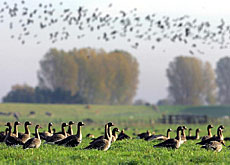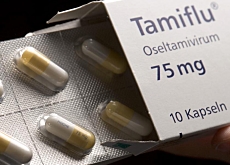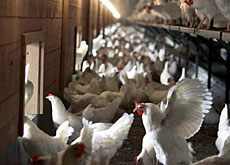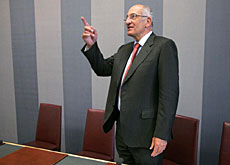Switzerland hosts bird flu conference

Gaudenz Silberschmidt, head of international affairs at the Federal Health Office, tells swissinfo about the significance of the bird flu conference in Geneva.
The three-day meeting on avian influenza and human pandemic influenza opened at the Geneva headquarters of the World Health Organization (WHO) on Monday.
The Geneva meeting is the latest in a series of conferences and meetings that have been held all over the world in the past few months to assess the challenge posed by the H5N1 strain of the bird flu virus.
H5N1 has so far been responsible for at least 60 human deaths across Asia.
This meeting is aimed at providing a global assessment of the situation from the information that has been gathered so far.
It will also identify the next steps for controlling bird flu in animals and the preparations to be carried out in case of a possible human flu pandemic.
Silberschmidt, who is leading the Swiss delegation at the conference, talks about the roles of the Swiss government and the Swiss pharmaceutical giant Roche, maker of the anti-viral drug Tamiflu.
swissinfo: The WHO says the aim of the conference is to forge a global approach for dealing with the threat of both an avian and a human flu pandemic. How confident are you that progress can be made over the next three days?
Gaudenz Silberschmidt: The conference is a landmark step towards improving the global strategy. It is an important sign that the avian flu crisis and a potential human flu pandemic can only be managed properly within the international multilateral system. All players, including the United States, acknowledge this.
swissinfo: The H5N1 strain is most likely to jump to humans in Asia. Is Switzerland focused on this or is it merely worrying about what could happen here?
G.S.: We currently have three different problems that need to be dealt with separately, but which are all interlinked. There is the avian flu, H5N1, which is mainly in Asia but has arrived in Romania and Turkey and could spread further. We have the annual flu season ahead of us, and there is the risk of a potential human pandemic where the most likely origin is currently H5N1.
Right now vaccination is taking place in Switzerland for the risk groups concerning the normal seasonal flu. We have also taken measures against the spread of avian flu and we are preparing for a potential human pandemic.
The Swiss government decided at the end of September to provide SFr4.8 million ($3.75 million) to the Food and Agriculture Organization to fight avian flu in Asia, because the best way of preventing a human pandemic is to control the animal epidemic.
The second-best way to fight a pandemic is to extinguish the fire right away through rapid reporting and through containment. This is where the three million doses of Tamiflu donated by Roche to the WHO could play a very important role.
The third is that if the first two fail, we would have to be ready to cope with a pandemic in every country.
swissinfo: A senior United Nations official said last week that fighting bird flu in southeast Asia would cost $100 million. Will Switzerland be making a further contribution?
G.S.: The SFr4.8 million is already a very substantial increase. We are looking into smaller additional funding but we are not prepared to give promises that can’t be fulfilled.
swissinfo: An international meeting of health ministers last month in Canada – which you attended – said more resources should be put into developing a vaccine against H5N1. Does the Swiss government agree and what concrete steps has or is it taking?
G.S.: We have asked companies to submit offers for the provision of 100,000 doses of an H5N1 vaccine, once they have made one. The government is currently drawing up a strategy concerning a pandemic vaccine, which will be announced before the end of the year.
swissinfo: The Swiss pharmaceutical company Roche is coming under increasing pressure from countries to waive its patent on its anti-viral drug Tamiflu. Has the Swiss government been asked to intervene?
G.S.: First I would like to clarify that we have a clear separation between private companies and the government in Switzerland. Nevertheless we obviously have a very good and very intense contact with Roche.
I would also stress that Roche has already made it clear that it is ready to give sub-licences to whoever is capable of producing Tamiflu. In Ottawa we asked those players – whether governments or private companies – who think they are capable of doing this to get in direct contact with Roche.
swissinfo-interview: Adam Beaumont
A three-day meeting on avian influenza and human pandemic influenza will be held at the Geneva headquarters of the World Health Organization (WHO) on Monday.
The aim of the meeting is to examine the two-pronged strategy of attempting to control avian influenza at its source in animals, while simultaneously preparing for pandemic influenza.
The meeting is co-organised by the WHO, the Food and Agriculture Organization, the World Organisation for Animal Health and the World Bank.
The H5N1 virus has infected at least 122 people in Asia and killed at least 62 since the virus resurfaced in late 2003.
Vietnam has suffered more than 40 of the 62 confirmed human deaths, while China has had three outbreaks in birds in recent weeks, but no human cases.
Vaccines effective against a virus pandemic are not yet available. Anti-viral drugs, such as Tamiflu, are the only medical defence.

In compliance with the JTI standards
More: SWI swissinfo.ch certified by the Journalism Trust Initiative



You can find an overview of ongoing debates with our journalists here. Please join us!
If you want to start a conversation about a topic raised in this article or want to report factual errors, email us at english@swissinfo.ch.